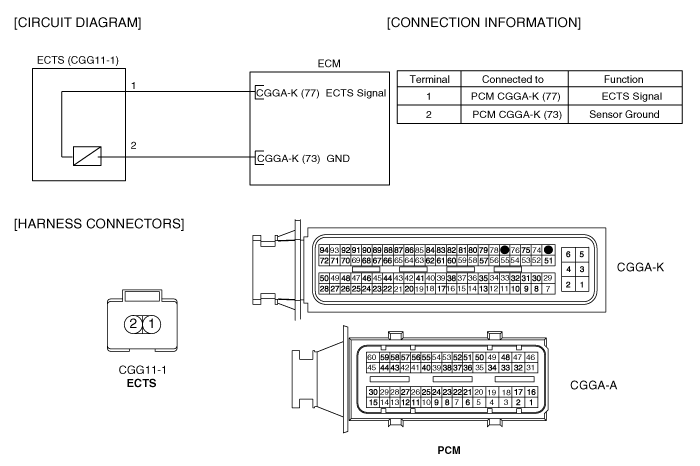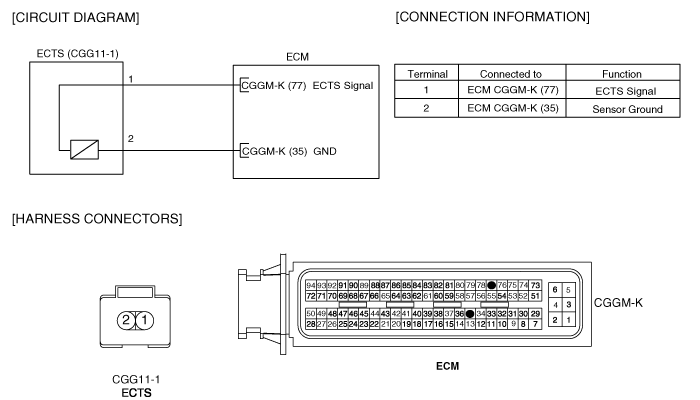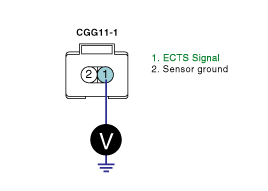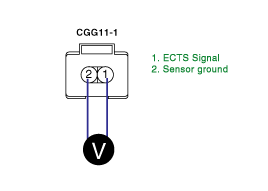Monitor "ECTS" parameter on scantool.


The Engine Coolant Temperature(ECT) Sensor measures the temperature of engine coolant. The Engine Coolant Temperature (ECT) Sensor is located near the thermostat housing of the cylinder head. ECT Sensor is a thermistor (A Variable Resistor that Changes Along with ECT) in series with a fixed resistor in the Engine Control Module (ECM). The ECM applies 5 volts to the ECT sensor. The ECM monitors the voltage across the ECT sensor and converts it into a temperature reading. When the engine is cold the ECT sensor resistance is high, and when the engine is warm the ECT sensor resistance is low. Therefore, when the engine is cold the ECM will receive a high voltage input, and when the engine is warm the ECM will receive a low voltage input. The signal from ECT sensor is used for Injection control, ignition timing, idle speed and cooling fan control.
If measured temperature is lower than the minimum threshold value, ECM sets DTC P0118.
(In this case, the input signal voltage is the maximum threshold vaue.)
Item | Detecting Condition | Possible Cause |
DTC Strategy | ● Signal check, high | ● Poor connection ● Open or short to power in signal circuit ● Open in ground circuit ● ECTS |
Enable Conditions | ● Increase of measured temp. after start〈 2.3℃ | |
Threshold Value | ● Measured temperature 〈 -38.3 ℃ | |
Diagnostic Time | ||
MIL ON Condition | ● 2 driving cycle |
Temperature [℃ (℉)] | Resistance (kΩ) |
-40 (-40) | 48.14 |
-20 (-4) | 14.13 ~ 16.83 |
0 (32) | 5.79 |
20 (68) | 2.31 ~ 2.59 |
40 (104) | 1.15 |
60 (140) | 0.59 |
80 (176) | 0.32 |


Connect scantool to DLC(Data Link Cable).
Warm up the engine to normal operating temperature.
Monitor "ECTS" parameter on scantool.

Is the "ECTS" parameter displayed correctly?

▶ Fault is intermittent caused by poor contact in the sensor’s and/or ECM’s connector or was repaired and ECM memory was not cleared. Thoroughly check connectors for looseness, poorconnection, ending, corrosion, contamination, deterioration, or damage. Repair or replace asnecessary and go to "Verification of Vehicle Repair" procedure.

▶ Go to "Terminal and Connector Inspection" procedure.
Many malfunctions in the electrical system are caused by poor harness and terminals. Faults can also be caused by interference from other electrical systems, and mechanical or chemical damage.
Thoroughly check connectors for looseness, poor connection, bending, corrosion, contamination, deterioration, or damage.
Has a problem been found?

▶ Repair as necessary and go to "Verification of vehicle Repair" procedure.

▶ Go to " Signal Circuit Inspection " procedure.
IG "OFF".
Disconnect ECTS connector.
IG "ON" & ENG "OFF"
Measure voltage between terminal 1 of ECTS harness connector and chassis ground.
Specification : Approx. 5V

Is the measured voltage within specification?

▶ Go to "Ground Circuit Inspection" procedure.

▶ Repair or replace as necessary and then, go to "Verification of Vehicle Repair" procedure.
IG "OFF".
Disconnect ECTS connector.
IG "ON" & ENG "OFF"
Measure voltage between terminal 1 of ECTS harness connector and chassis ground.(A)
Measure voltage between terminal 1 and 2 of ECTS harness connector.(B)
Specification : "A" - "B" = Below 200mV`

Is the measured voltage within specification?

▶ Go to "Component Insepction" procedure.

▶ Repair or replace as necessary and then, go to 'Verification of Vehicle Repair" procedure.
Check ECTS resistance.
IG "OFF".
Disconnect ECTS connector.
Measure resistance between terminal 1 and 2 of ECTS connector.(Component Side)
Temperature [℃ (℉)] | Resistance (kΩ) |
-40 (-40) | 48.14 |
-20 (-4) | 14.13 ~ 16.83 |
0 (32) | 5.79 |
20 (68) | 2.31 ~ 2.59 |
40 (104) | 1.15 |
60 (140) | 0.59 |
80 (176) | 0.32 |

Is the measured resistance within specification?

▶ Many malfunctions in the electrical system are caused by poor harness(es) and terminals. Faults can also be caused by interference from other electrical systems, and mechanical or chemical damage. So, check poor connections and the related circuit between ECM and component thoroughly. Repair as necessary and go to "Verification of Vehicle Repair" procedure.

▶ Substitute with a known - good ECTS and check for proper operation.
▶ If the problem is corrected, replace ECTS and go to "Verification of Vehicle Repair" procedure.
After a repair, it is essential to verify that the fault has been corrected.
Connect scan tool and select "Diagnostic Trouble Codes(DTCs)" mode.
Press F4(DTAL) and confirm that "DTC Readiness Flag" indicates "Complete".
If not, drive the vehicle within conditions noted in the freeze frame data or enable conditions.
Read "DTC Status" parameter.
Is parameter displayed "History(Not Present) fault"?

▶ System performing to specification at this time. Clear the DTC.

▶ Go to the applicable troubleshooting procedure.